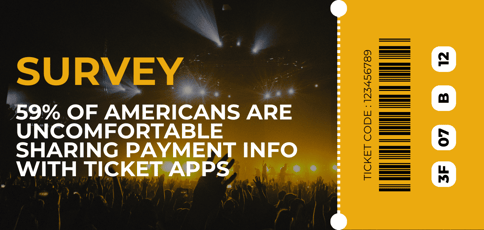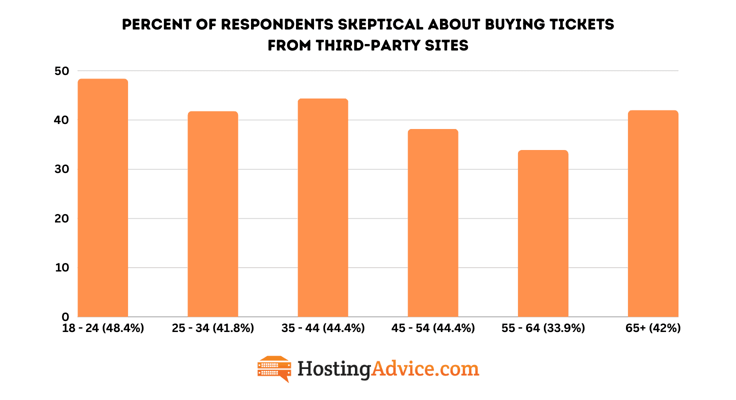
HostingAdvice survey reports that recent headlines around Taylor Swift and ticket resellers made concertgoers more skeptical about buying tickets through third-party/resell platforms.
Music fans are so eager to get their hands on tickets to sold-out events that they’re often easy targets for scammers. A new study from HostingAdvice, the online authority on web hosting and developer applications, revealed that a significant number of event ticket seekers have serious issues with sharing their financial information with third-party event ticket apps.
The numbers reveal shocking information about consumer attitudes toward reseller platforms in an era of scammers and fraudsters.
41% Say They’re Skeptical About Buying Tickets on Third-Party Platforms
The survey revealed that 41% of respondents admitted that recent headlines around Taylor Swift and ticket resellers made them more skeptical about buying tickets on third-party/resell platforms. The skepticism increases to 48% among Gen Z ages 18 to 24, highlighting generational awareness of the controversy regarding fraudulent Era’s Tour ticket resellers.

Gen Z showed the highest rates of concern for third-party ticketing selling platforms, followed closely by older Millenials and Gen X, which both had 44.4% of respondents claim skepticism regarding ticket resellers.
17% of Americans Have Experienced Fraud Concerns in the Last Year
Additionally, the survey found nearly one-fifth (17%) of Americans said they have experienced fraud concerns related to event tickets in the last year.
Examining survey results by age, we find a large disparity in the percentage of respondents who have experienced ticket fraud concerns. The concern for fraud among Gen Zers — those aged 18 to 24 — increased to 35%.
The results for other age groups include:
- 25 to 34 — 21.8%
- 35 to 44 — 25.6%
- 45 to 54 — 15.2%
- 55 to 64 — 5.2%
- 65+ — 5.4%
Surprisingly, those aged 55 to 64 and 65+ reported having the least concern for fraud, despite having a significant level of mistrust (33.9% and 42%) for buying tickets on third-party reseller platforms.
69% Fear They Will Get Hacked Sharing Financial Info on Third-Party Sites
While it’s common to share certain personal information with third-party apps to receive accurate information back (such as your location for concert tickets), sharing financial information can become a risk not worth taking.
Of those who are not comfortable sharing financial information:
- 69% fear they will get hacked
- 41% worry that these types of platforms are unsecure
- 14.6% say these platforms will not accept their payment of choice
Additionally, the survey found that nearly one-third of Americans (31%) are incentivized to share tracking features with third-party apps from personalized offers and targeted ads.

Fraudulent ticket resellers are using targeted ads to sell tickets to sold-out shows from top performers such as Madonna, Billy Joel, Drake, and Taylor Swift. Perhaps that’s why nearly 6 in 10 (59%) Americans surveyed said they do not feel comfortable sharing their payment information with third-party selling apps like StubHub or Ticketmaster.
In Conclusion
Despite rising concerns regarding the safety of ticket reselling platforms, consumers can take reasonable steps to protect themselves from fraudsters.
“Even with the issues surrounding Ticketmaster’s Taylor Swift Eras tour presale, it’s generally the safest option to buy your tickets from an official ticket distribution provider,” said Tim Keary, Contributing Expert for HostingAdvice. “If consumers do end up using third-party apps to purchase tickets, then the best way to protect their financial information is to use a cash sharing app like Paypal, which offers more protection for buyers and sellers than other virtual payment services.”
Users can download trusted payment apps such as PayPal, Venmo, and Cash App, which all offer fraud and buyer protection services. The fraud and buyer protections these apps offer can provide peace of mind when you’re purchasing event tickets from third-party sites.
Survey Methodology
A national online survey of 1,015 U.S. consumers, ages 18 and older, was conducted by Propeller Insights on behalf of HostingAdvice.com in February of 2024. Survey responses were nationally representative of the U.S. population for age, gender, region, and ethnicity. The maximum margin of sampling error was +/- 3 percentage points with a 95% level of confidence.
HostingAdvice.com is a free online resource that offers valuable content and comparison services to users. To keep this resource 100% free, we receive compensation from many of the offers listed on the site. Along with key review factors, this compensation may impact how and where products appear across the site (including, for example, the order in which they appear). HostingAdvice.com does not include the entire universe of available offers. Editorial opinions expressed on the site are strictly our own and are not provided, endorsed, or approved by advertisers.
Our site is committed to publishing independent, accurate content guided by strict editorial guidelines. Before articles and reviews are published on our site, they undergo a thorough review process performed by a team of independent editors and subject-matter experts to ensure the content’s accuracy, timeliness, and impartiality. Our editorial team is separate and independent of our site’s advertisers, and the opinions they express on our site are their own. To read more about our team members and their editorial backgrounds, please visit our site’s About page.



